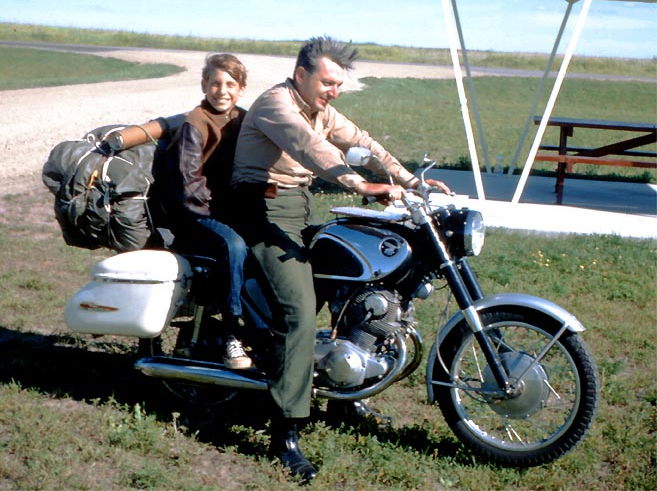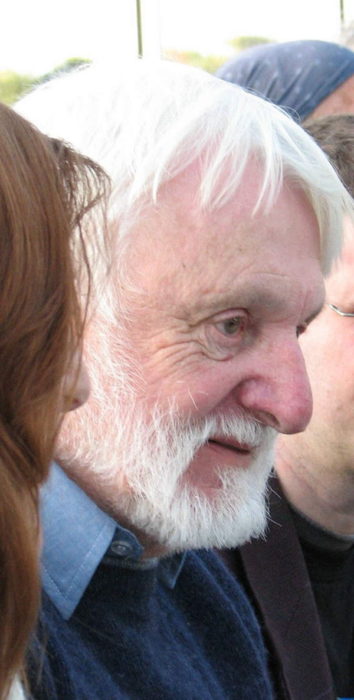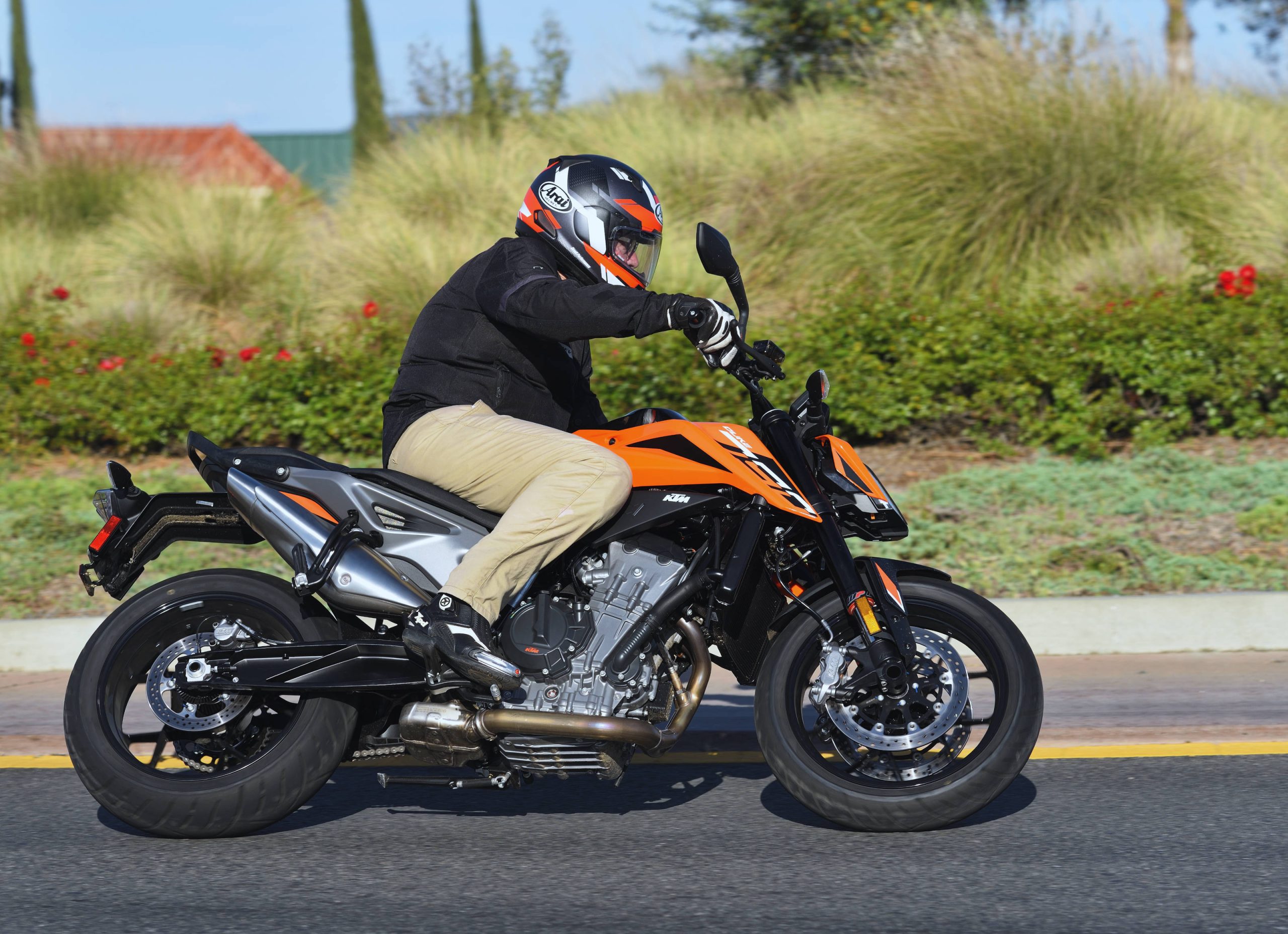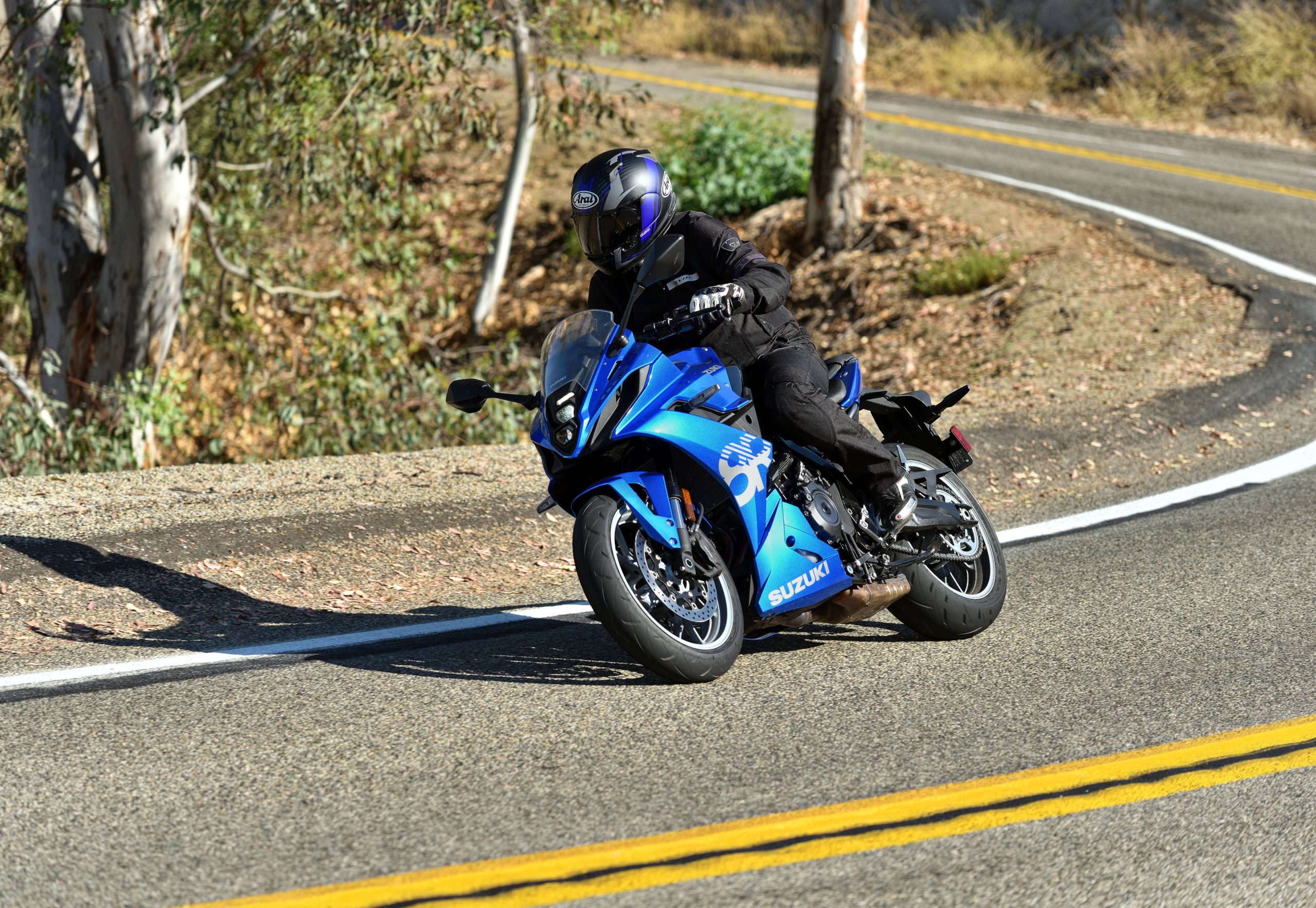Is it ironic that the most popular book ever written on the subject of motorcycling was a deep, often obscure tome authored by a middle-aged philosophy professor? Robert Pirsig’s Zen and the Art of Motorcycle Maintenance: An Inquiry Into Values, was first published in 1974 and went on to become a best seller. Pirsig recently passed away at his home in Maine.
Centered around a motorcycle trip Pirsig took with his son Chris, the book says very little, directly, about motorcycling or maintenance. Nevertheless, it is full metaphysical insights, as reflected in the following quotes from the book:
“The test of the machine is the satisfaction it gives you. There isn’t any other test. If the machine produces tranquility it’s right. If it disturbs you it’s wrong until either the machine or your mind is changed.”
“The real cycle you’re working on is a cycle called yourself.”
“Sometimes it’s a little better to travel than to arrive”
“In a car you’re always in a compartment, and because you’re used to it you don’t realize that through that car window everything you see is just more TV. You’re a passive observer and it is all moving by you boringly in a frame.
On a cycle the frame is gone. You’re completely in contact with it all. You’re in the scene, not just watching it anymore, and the sense of presence is overwhelming.”
Tragically, several years after their iconic motorcycle trip, Pirsig lost his son Chris, who was murdered at the age of 22. Robert Pirsig struggled with emotional problems throughout his life, and had been diagnosed as a paranoid schizophrenic years before he wrote his classic novel. If you are interested in additional details regarding Pirsig’s life, you can take a look at his Wikipedia page.
See more of MD’s great photography:








Sad to hear of his passing. I was a mechanical engineering student at the time I read it over 20 years ago, and it still influences my perception of quality to this day.
I’ve read the book twice over the years, and I still find myself reading chapters now and then. I love it and think he was a fantastic writer. I think the reason so many motorcyclists don’t make it through the book might be their expectations based on the title. I don’t find the book to be that much about motorcycles, but more about personal journeys, and the appreciation for the the journey, rather than the destination. All that wrapped up in a story that uses motorcycling and a motorcycle trip as a backdrop for some amazing incites into the workings of the human mind, and the things that we take for granted. All of the things that we should be conscious of and appreciate on a daily basis.
RIP Robert Pirsig
I read it many years ago and his list of “gumption traps” when doing mechanical work has been my guide ever since.
It is interesting that he rode a Honda twin, which with 500 mile fiddling had a relentless quality, though by today’s standards rather crude was probably part of its charm as you tended to be connected to every horsepower it gave out. Having his son attacked outside a Zen Institute is the kind of madness that God likes to inflict, He does have a sense of humour!
Pirsig fans,I recommend Zen and Now by Mark Richardson. It’s a great audiobook. I could never get through ZATAMM, but I listened to Zen and Now twice. It’s a great motorcycle book in its own right. Lots about the bikes.
I read Zen several times, while it can be thick it was influential in how I approach my own motorcycle and life maintenance. Every time I swing the leg over the seat, I’m present, and make sure I’m letting distracting thoughts float away with the rush of air around me. The road is no place for meandering chatauquas running in my head…
I was fortunate enough many years ago to have my copy of Zen and the Art of Motorcycle Maintenance autographed by Mr. Persig. Seems that every few years I will pull that out and read it just as a reminder of why I am passionate about some of the things I am. God speed Mr. Persig.
I was on my first 6,000 mile long distance touring trip in 1974 on my new Honda CB750 and I found this book in a bookstore and read it during our nights in Motels. 82 bikes and 54 years of continuous riding and doing my own repairs and maintenance makes me very aware of the peaceful, Zen like mental state that follows a job well done. The feelings between a man and his ‘ride,’ can be magical and very esoteric and border on infatuation. During the time he wrote this book, the world and academia was in chaos and many of us exhibited odd mental behavior swinging from manic to depressive and points between but most of us survived. I bought this book again a few years ago and still find it interesting and somewhat entertaining but still as slow as the authors old Superhawk, of which I owned a 250 and the 305. I pray you found peace Robert.
I enjoyed this book about 12 years ago, had picked it up in used book store and found it a nice glimpse into someone else’s reality. I read Neil Peart’s Ghost Rider book about same time, and let other’s in my family read it. Fair warning, it’s a heart breaking story of a man dealing with his grief by hitting the road. I was reading it while my sister in-law was succumbing to a brain tumor, and I could not put the book down. It took me on travels that I could not afford monetarily or allotment of time during those years. Available on Amazon, official title is Ghost Rider: Travels on the Healing Road
RIP. I’ve given this book a go twice, never it made it through. Too heavy on zen and light on motorcycles. The rambling train of thoughts, briliant insights they may be, just don’t hold my attention.
I read it when it came out and likely a couple of times since. Sadly, people with that level of intellectual horse power all to often get caught up in worlds that most of us don’t even see, ‘the real cycle you are working on is a cycle called yourself’. Beyond the slip into the abiss, it’s an interesting commentary on how this hobby has changed.. My first bike was a 250 and I toured on it. Bob toured 2-up on a 305 with full camping gear, who would think to do that now, a 300 is barely consider adequate for city duty. Andy Goldfine in his little book ‘Lightweight Motorcycle Travel for Terminal Cases’ expouses a theory that the best way to travel is not on a big rig that insulates you from the world at large but rather a small, lighter bike that opens you to it. Andy and Bob just might have that right, less is more.
an IQ of 170 at age nine is way more of a load than is on that little 305 in the picture. the guy that is worried about quality is riding a Honda.
lol yea, may have been a different book if he was touring on a 441 BSA
The book is a treasure. As a life-long motorcyclist and engineer, “Zen” has been one of the five or ten most influential books written during my historical perspective, IMHO. I have enjoyed reading it every few years as have my family members. I am due to read it again as soon as my wife is finished reading my well-worn and highlighted copy. I learn more about myself every time I read it.
A quote from the book that I have to continuously remind myself of:
“We take a handful of sand from the endless landscape of awareness around us and call that handful of sand the world.”
I should have it tattooed on the back of my right hand!
Thank you Mr. Pirsig.
Well said and quoted, TF. The book is full of one sentence gems like that, that fly over the heads of casual readers.
Had heard about this book for many years and finally read it in the year 2000. Of course the story line is somewhat convoluted and rambling at times. The book actually makes more sense to me now realizing that he had been diagnosed as a paranoid schizophrenic. Anyhoo, his focus on quality is the thing I remember when i think about this book. And the idea that no one cares more about your bike (or your life for that matter) than you. Learn how to take care of it (your bike and your life) yourself. You may not be an expert but you care more about getting things right.
I have personal experience with someone who suffered throughout their life with schizophrenia. It’s common for people to use the term “schizophrenic” for a normal person who is “of two minds” on any subject. It is always wrong to use the term “schizophrenic” in such way. It’s worse than wrong because it trivializes one of the most debilitating diseases extant, one that encroaches on virtually every aspect of the life of persons who suffer with it.
If it’s appropriate, the next time someone you know uses the term “schizophrenic” in such way, politely correct them, and suggest they learn about the disease and how inappropriate is such use of the term.
If only schizophrenia symptoms were as light as some persons imagine it to be. The movie “A Beautiful Mind” starring one of my favorite actors Russel Crowe is a great way to learn about the disease.
I was deeply saddened to hear of the untimely and tragic, violent death of Mr. Pirsig’s son.
RIP Mr. Pirsig.
Thanks for the insight, but did you read the book? I’ll refer you to Tom Baxter’s comment below in case you haven’t. It’s definitive.
Indeed. I had never given the condition much thought until a friend from Boy Scouts died as a result of it. Very bright guy, free thinker. And then around the age of 17-18 he suddenly seemed to go off the rails. We didn’t learn what was wrong until much later, when he’d been diagnosed and was receiving care. Despite that, he died around the age of 30, basically from failing to seek treatment for pneumonia.
I’m glad to see that the stigma surrounding mental illness and treatment seems to finally be dissipating somewhat. Long way to go, though, IMO.
well, there are many diagnoses that can turn out to be vitamin deficiencies, like schizophrenia masquerading as a niacin deficiency, etc. Many mental patients get different diagnoses from different doctors. We have a lot to learn about mental health and what is normal.
I must have read that book 6 times and his Lila. Great writer. The most difficult thing about pilgrimage is coming home. You have grown and your piece no longer fits the puzzle. Seems appropriate for his life.
I learned about Zen from my MSME advisor, R.E. Klein, at U of Illinois. Also a very brilliant guy who, even with tenure, was fired because kids couldn’t handle his (brilliant) teaching style. I was a bmw rider at the time, and earned a few brownie points by showing him the set of ignition points i carried with me in case that i had a failure. He hipped me to Pirsig’s book. Quite a few similarities between R.E. and Robert.
If you care, you can read R.E. Klein’s story here: https://drive.google.com/file/d/0B_K1YkFZz58CbkhFbjYwdVFlMVE/view
Those were innocent times as far a motorcycle travel. Look at that bike and their equipment. I took my first trip to the Rockies from Illinois in 78 with stuff lashed to a Guzzi V7 Sport. It worked but the main lesson I learned was get a fairing. I didn’t know how or that you could do things to avoid saddle soreness.
As far as the philosophy the guy was having a mental breakdown. His philosophical compass was twitchy and unreliable. His emotional state probably worse. I’ve never been tempted to revisit it. The philosophical destination is a sort of dead end I think, it’s all about the trip.
On second thought. $6.24 for a Nook book. It just arrived.
I tried getting thru it as well and never succeeded. I have trouble reading philosophy because for the most part it is too idealistic and removed from the real world. (and I grew of age in the 60’s)
“In a car you’re always in a compartment, and because you’re used to it you don’t realize that through that car window everything you see is just more TV. You’re a passive observer and it is all moving by you boringly in a frame.
On a cycle the frame is gone. You’re completely in contact with it all. You’re in the scene, not just watching it anymore, and the sense of presence is overwhelming.”
my addendum:
Unless you are wearing glasses behind a full face helmet and the windshield of a large touring bike or sport tourer like I am these days. Sometimes I miss my open face helmet and no shield. Seems like I was closer to nature when riding then.Especially the bugs lol. Luckily I can still feel the wind and the rain for the most part.
RIP Mr Pirsig
Read it early in my life and skipped over most of the philosophy which I could not get a grasp on at the time, just as reading Sartre was work. But I enjoyed the story of the trip. Interesting the background behind it. RIP R.P.
Tried to read it a couple of times, but frankly it was a bit over my head.
Need to find a Dummy’s Guide for it.
there are guys that won’t ride to starbuck’s on less than a 1200 g/s…
In the course of a 60 year riding career, including road racing, long tours and commuting on dozens of bikes, it was the above quote that steered me along in evaluating my motorcycling experiences. Furthermore, throughout the book, the author searched for the definition of QUALITY. My recollection of the simple joys of setting the valves of an old /5 BMW around a campfire, with a 10mm wrench, a matchbook (for clearance) and a dime (for tightening and loosening the tappet screw) plays as well as the thrills from road racing in the 70s and 80s. The bikes are vastly different, but somewhere inside of all the experiences is Quality, different for each of us.
A joy of aging is re reading this book every few years. It keeps getting richer.
Good by by to an old, important friend I never met.
Well stated, Tom Baxter.
Loved that book. Read it at around 13-14 yo. It changed my life. RIP Rober Pirsig.
Pirsig had a profound impact on a whole generation of young men.